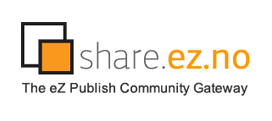Import export from ODF
Thursday 18 June 2009 3:58:45 am
This article is a quick guide to one of the powerful publishing features of eZ Publish: the ability to import and export content using the eZ OpenDocument Format (eZODF) extension. This article will describe some of the benefits of the extension as compared to online content editing. It will also provide an illustrated how-to to show how easy the feature is to use.
At the time of writing, the latest version of eZ Publish is 4.0.2, with the eZODF extension version 2.0. Note that the concepts and procedures described in this article might vary somewhat for older or newer versions.
To get the most out of this article, the reader should be familiar with the eZ Publish content model. Also, note that this article is not intended to be a comprehensive guide to the eZODF extension. Please consult the documentation for more information.
ODF definitions
To those who are unfamiliar with the OpenDocument Format, it is similar in function to the formats that are natively used in Microsoft Office and other desktop office applications. However, it is an Open Source standard. The Wikipedia definition of ODF is as follows:
The OpenDocument format (ODF) is a file format for electronic office documents such as spreadsheets, charts, presentations and word processing documents. The specifications were originally developed by Sun. Published ODF standards meet the common definitions of an open standard, meaning they are freely available and implementable.
Many governments (as well as many other organizations) are realizing the power and benefits of open standards and also ODF. Some governments have introduced policies mandating or encouraging the use of such open standards. By supporting and using open standards, such as by the availability of the eZODF extension, eZ Publish is a very valuable Enterprise Content Management System for such markets.
The OpenOffice.org suite used in this article, which is fully compatible with the eZODF extension, can handle all of your office tasks such as:
- word processing
- spreadsheets
- presentations
- graphics
- databases and more...
Word processor documents in OpenDocument format are most often saved in OpenDocument Text files, with the file extension ".odt".
OpenOffice.org can open and edit not only ODF documents, but also Microsoft Office documents. It is freely available, easy to use, and available in many languages. It can be installed on Windows, Mac, and Linux operating systems.
The screenshots below shows the similarity in user interfaces between OpenOffice.org Writer and Microsoft Word.
MS Office Word 2003
OpenOffice.org Writer 3.0
The eZODF extension
The importing and exporting of content to eZ Publish is accomplished through the eZ Open Document Format (ODF) extension. This extension has been included with eZ Publish by default since eZ Publish 3.8.
The eZODF extension's requirements include eZ Publish 3.8 or later and the zlib PHP extension. By default, the eZODF extension can import and export ODF documents; if OpenOffice.org is installed on the web server, the extension also supports the importing and exporting of Microsoft Word documents. The eZODF extension can preserve many formatting elements, such as tables, lists, images and images captions, headers, and more.
To understand how the eZODF extension integrates into the eZ Publish publishing process, first consider how content objects are stored in eZ Publish. Content objects consist of attributes, the contents of which are displayed and formatted most commonly in XHTML through eZ Publish templates. Due to this separation of content and design, eZ Publish is capable of exporting content to other formats (such as ODF), and of importing external content that has been processed by an extension to be compatible with eZ Publish's storage format.
